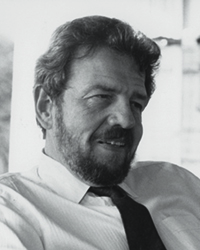During the president's 24-year tenure, SF State transformed into a campus with a conscience.

Photo by Alain McLaughlin
On February 11, 1989, Robert A. Corrigan was inaugurated as the 12th president of San Francisco State University. Standing before students and faculty, the new leader spoke of his dream for SF State to become "a different kind of public university, one that is organized around the concept of urban partnership" with faculty members who view the surrounding "city as their classroom." More than two decades later, as Corrigan prepares to retire from the presidency in July, his dream has been realized.
Today, more than 500 service-learning courses and dozens of University institutes and initiatives link classroom and community. On a daily basis, students and faculty address the region's most pressing concerns, including college preparedness, environmental protection and health care for low-income families. In the past academic year alone, SF State students have donated the equivalent of more than $18 million dollars of services to Bay Area communities.
SF State has earned national recognition for its approach to education, including designations as both a Princeton Review "College with a Conscience" and Carnegie Foundation for the Advancement of Teaching "Community Engagement Institution." Last May, the University earned the highest federal recognition possible for its commitment to community service, a Presidential Award in President Obama's Higher Education Community Service Honor Roll.
Corrigan will leave his post with significant progress made on another early goal, to "work with the city and its local school system to change the conditions which have put so many urban students at educational risk." Throughout his presidency, Corrigan has worked to create a pathway to college for all students, regardless of their backgrounds. In the late 1990s, Corrigan oversaw the placement of college tutors in K-12 classrooms nationwide when he chaired President Bill Clinton's Steering Committee of College and University Presidents for two initiatives, "America Reads" and "America Counts." In 2001, Corrigan extended the campus' reach to the educational needs of nearly 2,000 low-income children when SF State assumed management of San Francisco's Head Start program.
San Francisco Mayor Edwin Lee said at a recent luncheon celebrating the legacy of the president and his wife Joyce Mobley Corrigan, "They have added tremendous value to our civic life." The president's "commitment has always extended well beyond San Francisco State," Lee added, pointing to SF Promise, a prime example of the kind of partnership Corrigan dreamed of so many years ago. Launched in 2009, the program "promises" a spot at SF State for all San Francisco public high school graduates who meet admission standards. "SF Promise allows us to look our children in the eyes," Lee said, and tell them, "we'll make sure you graduate."
The president has long championed programs supporting the needs of students at an urban university, students whom, he has said, "are, on the whole, older than the average, more female than male, more minority than majority, and often the first in the family to be university students." In his inauguration speech, Corrigan called for the hiring and retention of a faculty reflective of the diversity of this student population, another early goal he was able to achieve.
During the Corrigan years, the campus has focused on social justice and equity ("That is our brand," Corrigan has said, "and it is one we are proud to own.") where people of color constitute 37 percent of the faculty. Increasingly, these instructors have been educated at leading institutions, including Harvard, Yale and MIT. In an effort to help balance scholarship with teaching, the president has led the charge to reduce course loads and provide more support for grants and contracts for faculty.
The president has also been able to help strike a balance in student discourse, a careful one between free speech and civility. In the past decade, when hostile situations flared between pro-Israeli and pro-Palestinian student groups, the president joined forces with the Anti-Defamation League (ADL) and others to establish discussion groups among faculty, students and community leaders, and ultimately, achieve peaceful resolution of disagreements.
"This has always been a feisty campus," Corrigan once said of SF State, a University known for the longest student strike in the nation's history. It is not likely it will ever be a calm place, but as the ADL and other outside organizations have noted, the culture of campus has changed for the better. The president's promotion of tolerance on campus and longtime championing of diversity were among the reasons Diverse: Issues in Higher Education magazine presented Corrigan with the 2012 John Hope Franklin Award for outstanding contributions to higher education.
See more on The Legacy of Robert A. Corrigan
See the sidebar President Corrigan at a Glance